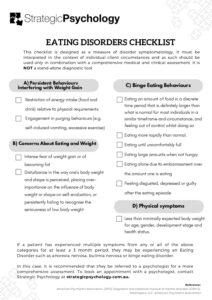
Eating Disorders Checklist
468 KB
This checklist is designed as a measure of disorder symptomatology. It must be interpreted in the context of individual client circumstances and as such should be used only in combination with a comprehensive medical and clinical assessment. It is NOT a stand-alone diagnostic tool.
This checklist is designed as a measure of disorder symptomatology. It must be interpreted in the context of individual client circumstances and as such should be used only in combination with a comprehensive medical and clinical assessment. It is NOT a stand-alone diagnostic tool.
A) Persistent Behaviours Interfering with Weight Gain
Restriction of energy intake (food and drink) relative to physical requirements
Engagement in purging behaviours (e.g. self-induced vomiting, excessive exercise)
B) Concerns About Eating and Weight
Intense fear of weight gain or of becoming fat
Disturbance in the way one’s body weight and shape is perceived, placing over-importance on the influence of body weight or shape on self-evaluation, or persistently failing to recognise the seriousness of low body weight
C) Binge Eating Behaviours
Eating an amount of food in a discrete time period that is definitely larger than what is normal for most individuals in a similar timeframe and circumstance, and feeling out of control whilst doing so
Eating more rapidly than normal
Eating until uncomfortably full
Eating large amounts when not hungry
Eating alone due to embarrassment over the amount one is eating
Feeling disgusted, depressed or guilty after the eating episode
D) Physical symptoms
Less than minimally expected body weight for age, gender, development stage and health status
If a patient has experienced multiple symptoms from any or all of the above categories for at least a 3 month period, they may be experiencing an Eating Disorder such as anorexia nervosa, bulimia nervosa or binge eating disorder.
In this case, it is recommended that they be referred to a psychologist for a more comprehensive assessment. To book an appointment with a psychologist, contact Strategic Psychology on (02) 6262 6157 or email support@strategicpsychology.com.au.
